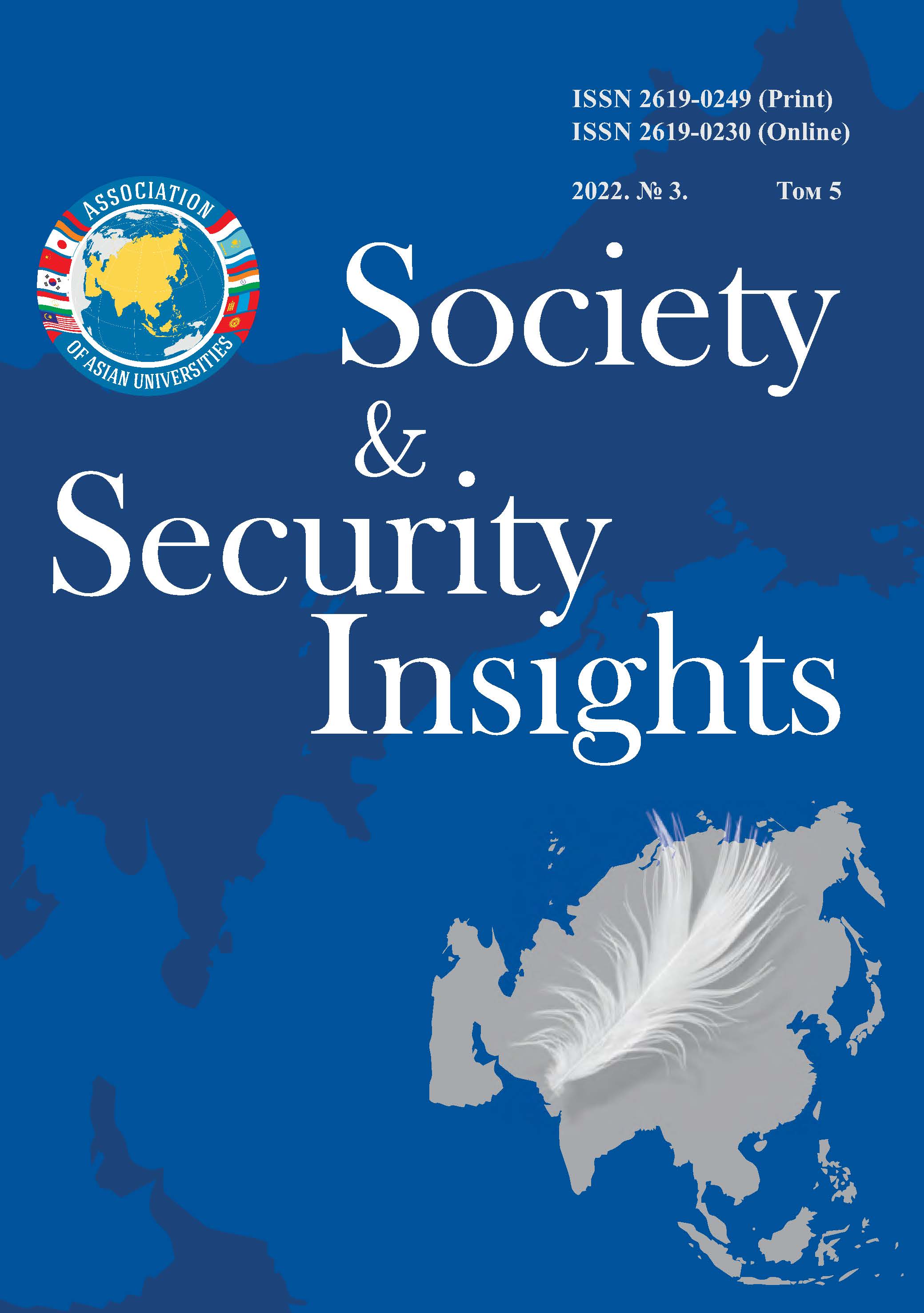SATISFACTION WITH THE EDUCATIONAL PROCESS AS A FACTOR OF PROTEST ATTITUDES OF STUDENT YOUTH
Main Article Content
Abstract
Education is the main area of youth employment. It can be the main source of personal and group discontent. Analyzing the content of protest sentiments of students as their reaction to the ongoing events in the field of education, it is possible to predict and prevent protest behavior, as well as assess the quality of the educational environment. The empirical study included the collection and analysis of data obtained through questionnaires (n=608), in-depth interviews (n=12) and focus groups (n=10). The study identified the main indicators of satisfaction with the educational process of students, their attitude to distance learning, as well as problems that can provoke protest mood.
Downloads
Metrics
Article Details

This work is licensed under a Creative Commons Attribution 4.0 International License.
Authors retain the copyright of their manuscripts, and all Open Access articles are distributed under the terms of the Creative Commons Attribution License, which permits unrestricted use, distribution, and reproduction in any medium, provided that the original work is properly cited.
References
Баранова Г. В. Методика анализа протестной активности населения России // Социологические исследования. 2012. № 10. С. 143–152.
Безрукова Е. Ю. Молодежный протест: риски, перспективы, последствия // Конфликтология. 2020. Т. 15, № 1. С. 94–103.
Вардикян М. С., Николаева А. А., Савченко И. А. Социологическое исследование протестных настроений современной молодежи // Власть. 2021. Т. 29, № 1. С. 118-122.
Ковтун Е. И. Специфика современных молодежных протестных движений // Вопросы политологии. 2019. Т. 9, № 4. С. 712–721.
Марин Е. Б. Молодежные протестные настроения в Приморском крае (на примере студенчества) // Вестник Института социологии. 2018. Т. 9, № 3. С. 63–82.
Меркулов П. А., Проказина Н. В. Методологические подходы к анализу протестной деятельности молодежи // Среднерусский вестник общественных наук. 2017. Т. 12, № 1. С. 15–23.
Нагайцев В. В. Пустовалова Е. В. Уровень социальной напряженности в системе показателей социального благополучия населения региона // Известия Алтайского государственного университета. 2010. № 2-2 (66). С. 209–213.
Петухов В. В. Динамика социальных настроений россиян и формирование запроса на перемены // Социологические исследования. 2018. № 11. С. 40–53.
Петухов Р. В. Почему люди хотят изменений? Исследование В. Петуховым причин актуализации общественного запроса на перемены // Вестник Института социологии. 2022. Т. 13, № 2S. C. 61–73.
Разработка и продвижение комплекса мер социального характера по снижению уровня социальной напряженности и конфликтности населения в Алтайском крае в 2018-2020 гг. / В. В. Нагайцев [и др.]. Барнаул: Изд-во АлтГУ, 2019. 350 с.
Руденкин Д. В. Импульсы роста протестной активности российской молодежи: кейс Екатеринбурга // Конфликтология / nota bene. 2020. № 1. С. 1–14.
Тощенко Ж. Т. Социальное настроение – феномен современной социологической теории и практики // Социологические исследования. 1998. № 1. С. 21–35.
Хайкин С. Р., Попов Н. П. Протестные настроения на Северном Кавказе: общее и особенное // Мониторинг общественного мнения: экономические и социальные перемены. 2012. №4 (110). С. 14-28.
Шаповалова И. С., Валиева И. Н. Протестный потенциал регионального студенчества в России: социальные предпосылки // Интеграция образования. 2022. Т. 26, №2. С. 345–362.
Шлыкова Е. В. Потенциал протестной активности молодежи в условиях риска: анализ случая // Вестник Института социологии. 2015. Т. 6, № 2. C. 117–136.
References
Avtsinova, G. I. (2015). Protest Potential of Russian Youth: Research Paradigm and Political Practice. PolitBook, 1, 111–126. (In Russ.).
Baranova, G. V. (2012). Methods for Analyzing the Protest Activity of the Population of Russia. Sociological Research,10, 143-152. (In Russ.).
Bezrukova, E. Yu. (2020). Youth Protest: Risks, Prospects, Consequences. Conflictology, 15(1), 94–103. (In Russ.).
Vardikjan, M. S., Nikolaeva, A. A., Savchenko, I. A. (2021). Sociological study of protest mood of modern youth. The Authority, 29 (1), 118-122. (In Russ.).
Kovtun, E. I. (2019). Specificity of Modern Youth Protest Movements. Political Science Issues, 9(4), 712–721. (In Russ.).
Marin, E. B. (2018). Youth Protest Moods in Primorsky Region (on the Example of Students). Bulletin of the Institute of Sociology,9(3), 63–82.(In Russ.).
Merkulov, P. A., Prokazina, N. V. (2017). Methodological Approaches to the Analysis of the Youth Protest Activity. Central Russian Journal of Social Sciences,12(1), 15–23. (In Russ.).
Nagaytsev, V. V., Pustovalova E. V. (2010). The Level of Social Tension and Conflict in the System of Social Indicators for Measuring Social Wellbeing of Population in Regions. Izvestiya of Altai State University, 2-2(66), 209–213. (In Russ.).
Petuhov, V. V. (2018). Dynamics of social moods of Russians and the formation of a request for change. Sociological Research, 11, 40-53. (In Russ.).
Petukhov, R. V. (2022). Why do people want changes? V. V. Petukhov’s study of the reasons for the actualisation of the public demand for changes. Bulletin of the Institute of Sociology, 13(2S), 61–73. (In Russ.).
Development and promotion of a set of social measures to reduce the level of social tension and conflict of the population in the Altai Territory in 2018-2020. (2019). V.V. Nagajcev (et al.). Barnaul, AltGU, 350. (In Russ.).
Rudenkin, D. V. (2020). Growth Impulses of Protest Activity of Russian Youth: The Case of Yekaterinburg. Conflictology / nota bene, 1, 1–14. (In Russ.).
Toshhenko, Zh. T. (1998). Social mood – a phenomenon of modern sociological theory and practice. Sociological Research, 1, 21-35. (In Russ.).
Hajkin, S. R., Popov, N. P. (2012). Protest moods in the North Caucasus: general and special. Monitoring of Public Opinion: Economic and Social Changes, 4 (110), 14-28. (In Russ.).
Shapovalova, I. S., Valieva, I. N. (2022). Protest Potential of Regional Students in Russia: Social Preconditions. Integration of education, 26(1), 345-362. (In Russ.).
Shlykova, E.V. (2015). Young People’s Protest Potential in a High-Risk Environment: Case Study. Bulletin of the Institute of Sociology, 6(2), 117–136. (In Russ.).


 https://orcid.org/0000-0001-5846-1297
https://orcid.org/0000-0001-5846-1297